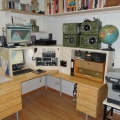DGPS and Marine bands?
Hi, I am a wery new Kiwi-station in Finland. OH6LSL, Kokkola.
My first impressions are wery positive! This is a great system.
Few quiestios:
- Marine bands info how to add?
- DGPS Decoding?
Janne
OH6LSL
My first impressions are wery positive! This is a great system.
Few quiestios:
- Marine bands info how to add?
- DGPS Decoding?
Janne
OH6LSL

Comments
http://www.blackcatsystems.com/software/dgps_decoding_software_sdr.html
The KiwiSDR provides 10KHz of IQ., and up to 3.1485KHz of USB bandwidth. WAV files can be combined with SOX, but it seems to be a lot of additional effort to try to capture 40KHz at once. I'd use a different SDR or work with the 10KHz IQ. I am interested in what you finally do.
Ron
KA7U
The Mac version of the app can decode from RFSpace and AFEDRI SDRs by directing interfacing with them, which I do from time to time, although I mostly just record a 50 kHz or so spectrum overnight and then run the IQ files in the morning. It is nice to be able to do live decoding from time to time, however.
Please see here for how to change the station label/markers: http://kiwisdr.com/quickstart/index.html#id-user-marker
Since the very beginning people have asked for a mode where the Kiwi could act like a traditional SDR, providing a single IQ channel with as wide a bandwidth as possible (so external SDR software could be used etc.) I have resisted doing this because its not really in keeping with goals of the project. You can buy cheaper/better SDRs if this is what you want to do.
But it seems like we're slowly going in that direction. We didn't used to have IQ output, or an external connection API, or even the selectable channel configuration modes that we do now (4snd + 4wf or 8snd + 2wf). So maybe someday we'll end up with a third option of a single channel at whatever bandwidth turns out to be possible.
As to what the single channel bandwidth might be, well, that's a difficult question. There are some bottlenecks due to the simple low-cost design of the Kiwi. It would just have to be tried with increasing bandwidth until there started to be buffering/realtime-response problems. Since you can get 8 channels at 10 kHz each now you would expect a single channel at 80 kHz (minimum) shouldn't be a problem. That's probably correct.
Projects always seem to evolve in different directions vs the original plan, don't they
What initially attracted me to the KiwiSDR was the ease of putting it online for others to use, since I live in a relatively low noise environment and have fairly decent antennas. But now I am also interested in the ability to demodulate multiple frequencies in parallel. I'm hoping to be able to devote some time to better understanding the API, and start playing around.
Maybe I'm missing the point, but I've taken a look at your http://www.blackcatsystems.com/software/dgps_decoding_software_sdr.html webpage. I initially thought you were using the data to provide a high accuracy position fix or GPS correction, but this doesn't seem to be the case, it just looks as if you are logging the stations received.
As DGPS signal transmit continuously, would it not be possible to use the same methodology as is being applied to WSPR and FT8 using kiwirecorder.py and 'scan' the DGPS band ?
Regards,
Martin - G8JNJ
Right, the app is purely meant as a logging tool, there's a subset of DXers that run decoding sessions every night to see which stations can be received. It's not used at all for GPS correction, although as you note it certainly could be.
Yes, you could scan through the DGPS band and decode some of the channels at a time. However, from our experience in decoding all night for a few years, we've discovered that there are occasional brief openings to a particular station that might last only a few seconds. (NDB hunters have noticed this as well of course, for longer) It is not uncommon to get 5 or 10 decodes from a particular station in a row, and then that is it. Nothing else. So if you don't monitor the entire band at once, you risk not listening in the right place at the right time (which was the original purpose of Amalgamated DGPS, to decode every DGPS channel in parallel).
Hi Chris,
Ah OK understood. I've also noticed this when DXing NDB's.
I think scanning would probably capture most, but I guess that's not good enough if you are a really avid DX'er.
Happy Christmas everyone,
Martin - G8JNJ